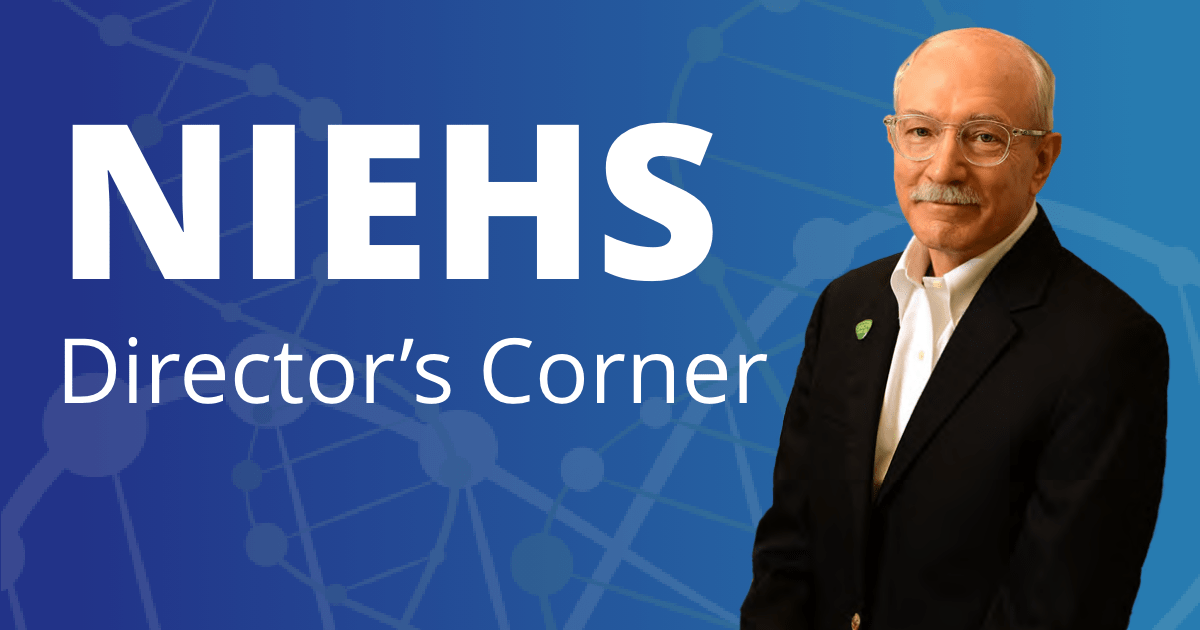When it comes to health and well-being, sleep often doesn’t get the attention it deserves, in my opinion. Yet, as we delve deeper into the science, it becomes increasingly clear that sleep is a cornerstone of health, impacting everything from cognitive function and emotional resilience to cardiovascular outcomes and disease risk. To shed light on this critical topic, I recently had the pleasure of talking with Chandra Jackson, Ph.D., an NIEHS epidemiologist who studies how our environment can influence sleep health and, in turn, our overall health. She leads the institute’s Social and Environmental Determinants of Health Equity Group.
During our conversation, Dr. Jackson underscored the profound ways environmental factors — such as inopportune light exposure, noise, and extreme temperature — can affect sleep duration, quality, and timing. She highlighted the biological connections between disrupted sleep and conditions like hypertension, poor cognitive performance, mood disorders, certain cancers, type 2 diabetes, and even Alzheimer’s disease. Dr. Jackson also emphasized how positive environmental exposures, such as morning sunlight and access to green spaces, can improve sleep and foster better health outcomes for all.
In addition, Dr. Jackson pointed out practical steps individuals and communities can take to optimize their sleep environments. Her insights provide a compelling case for prioritizing sleep as an essential component of health and well-being. Dr. Jackson also shared her career journey and what inspired her to better understand and contribute to the science of sleep.
Sleep’s essential roles in human health

Rick Woychik: Can you provide an overview of why sleep is important for health?
Chandra Jackson: Sure. Sleep is essential for many biological, psychological, and physiological reasons. We know that sleep provides a variety of benefits, including physiological restoration. During sleep, the body engages in cellular repair. In particular, muscles and bones, and even DNA, actually get repaired. A lot of restorative activity occurs during sleep.
In addition, breathing slows down and blood pressure drops while we sleep. So, when a person doesn’t sleep enough or doesn’t get quality sleep, it can increase their risk of hypertension.
Sleep is also important for memory and learning. During sleep, memories are consolidated, and synaptic connections that form in the brain throughout the day are strengthened or eliminated depending on their importance from, for instance, an evolutionary perspective. We’re wired for survival, so the brain prunes unnecessary synaptic connections deemed unnecessary to enhance memory. We’ve also recently realized that the brain’s glymphatic system clears waste from the brain, like beta-amyloid, during sleep. This has potentially important implications for conditions like Alzheimer’s disease.
The connection between poor-quality sleep and conditions like Alzheimer’s disease or certain dementias is becoming clearer, although the scientific evidence is still emerging. Current findings are strong and based on experimental and epidemiological evidence, but they’re not yet as established as, say, the relationship between poor sleep and cardiovascular disease. For instance, the American Heart Association recently recognized poor sleep, particularly short sleep duration, as an established risk factor for cardiovascular disease. Other dimensions of sleep will likely prove even more important.
Mood, decision-making, and appetite
RW: This is all fascinating. What else do we know about sleep?
CJ: A well-rested brain results in better concentration, greater attention, and improved decision-making, including ethical decisions. Also, those who are sleep-deprived are more likely to experience anxiety and mood disorders, including depression.
Additionally, hormonal regulation occurs during sleep. Growth hormone is mainly released during sleep, and sleep is critical for balancing hormones. For example, appetite-regulating hormones like leptin and ghrelin are influenced by sleep. When someone is sleep-deprived, ghrelin, associated with hunger, is upregulated, while leptin, associated with satiety, is downregulated. This means you’re more hungry and less satisfied when sleep-deprived.
Sleep is also tied to reproductive hormones like estrogen. And melatonin, which induces sleep, is also an antioxidant. Lack of melatonin exposure can increase the risk of certain cancers.
Start your day with sunshine
RW: What are some environmental and lifestyle factors that impact sleep quality, and how can individuals improve their sleep health?
CJ: Light is the strongest synchronizer of the light-dark cycle. Artificial light like LEDs can disrupt sleep. LEDs suppress melatonin production much more quickly than candlelight or incandescent light. Good sleep health involves minimizing exposure to electronic screens before bed, ensuring your sleep environment is quiet and dark, and especially maintaining consistent sleep and wake times — even on weekends. These small changes can make a significant difference.
Sunlight exposure in the morning is also beneficial. Natural light helps to regulate our biological clock, improving alertness during the day and preparing the body for better sleep at night.
Noise is another significant factor in sleep health. Whether it’s from airplanes, trains, or city sounds, noise can disrupt sleep and lead to conditions like cardiovascular disease. Temperature is critical, too. Sleeping in a room that’s too hot or too cold can make it difficult to sleep well.
When we eat and exercise matters
RW: What about factors like nutrition and exercise?
CJ: Nutrition is a big factor in sleep health, particularly when it comes to meal timing. It’s referred to as chrononutrition. Emerging research suggests that not eating close to bedtime and adhering to time-restricted eating can improve physiological processes and, consequently, sleep. Eating within a few hours before bed is not recommended.
As for exercise, a vigorous workout too close to bedtime may disrupt sleep onset because of its stimulating effects, but light, restorative activities like yoga may be helpful. Timing is essential — exercise earlier in the day is typically better for sleep quality.
Access to green spaces is another positive influence on sleep health. Spending time in environments you enjoy — whether it’s a park, a beach, or the mountains — can enhance relaxation and promote better sleep. Social connections, facilitated through communal spaces, also play a significant role in promoting relaxation and better sleep.
Individual variability, circadian rhythms
RW: How much individual variability exists in sleep needs, and how does this influence recommendations for healthy sleep?
CJ: Regarding individual variability, it does exist, but not to the extent many people may believe. For instance, there are people who say they function well on just four hours of sleep. The evidence strongly suggests otherwise. Most people who believe they perform well on minimal sleep simply don’t realize how much better they would feel and perform with adequate sleep. Experimental studies consistently show that individuals perform poorly on objective tests of vigilance and cognitive function when sleep-deprived, even if they perceive no issues.
We know that sleep is multidimensional, involving several independently important factors. Those include sleep duration, sleep quality, and sleep timing. Dan Buysse, a leading sleep researcher whom I’ve collaborated with, developed the most widely accepted criteria for defining good sleep. For adults, sleep duration should be at least seven hours. Previously, the recommendation was seven to nine hours, but eventually, the upper limit was removed because so many people are sleep-deprived. It wasn’t ideal to suggest people limit their sleep when many aren’t even meeting the minimum recommendation.
Another key component is sleep satisfaction, which is entirely self-reported. This has been shown to correlate strongly with health outcomes because individuals typically know whether they’re getting enough rest.
Other aspects of good sleep include regularity and efficiency — for instance, spending at least 85% of your time in bed actually sleeping when that is the intention is recommended. These criteria are well-documented and evolving as new evidence emerges.
And I would be remiss if I didn’t briefly discuss circadian rhythms. Sleep and circadian rhythms are deeply interconnected, as the body’s internal clock influences when we feel awake or sleepy. Circadian rhythms regulate core body temperature, melatonin production, and other biological processes that prepare the body for rest. Disruption of circadian rhythms, such as through exposure to artificial light at night, can suppress melatonin and negatively impact sleep.
Future directions
RW: Any final thoughts for Environmental Factor readers?
CJ: Going forward, it would be particularly useful to identify biomarkers related to sleep health and circadian function, which can advance our fundamental understanding and may aid in diagnosis of sleep disorders and development of new treatments. It will also be important to continue to investigate how improved sleep might mitigate the effects of environmental exposures, such as air pollution or other toxicants. This could have profound implications for public health.
Another exciting area involves more fully integrating sleep research with other health behavior domains, such as nutrition and physical activity. A better understanding of how these factors can interact with sleep will provide actionable insights for individuals and communities. Sleep research coupled with environmental optimization has the potential to improve not just individual health but also outcomes across entire populations while addressing health disparities.
Source link
factor.niehs.nih.gov


